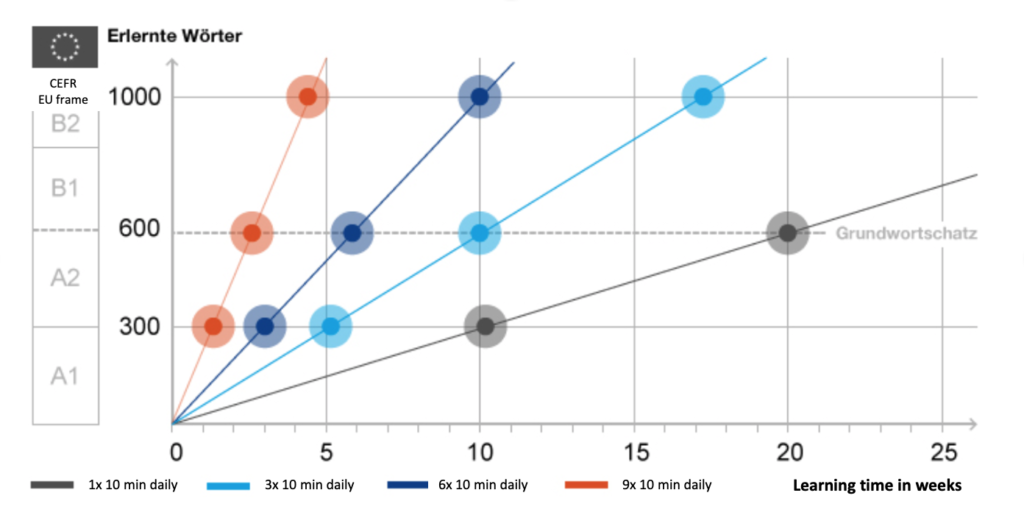10-minute units accelerate your learning speed. They also shorten the time you need to reach your desired level – especially compared to conventional vocabulary cramming.
Your brain continues to learn for about 7 minutes after each intake phase. Even if you already have other things on your mind. You do not notice it, but your brain gives you 7 minutes of learning time each.
Split your studying time!
Learning ten minutes per day for four weeks (a total of about 300 minutes) is more useful than studying five hours (also about 300 minutes) in one day. This does not mean that you can only learn for 10 minutes a day. You can always study as many hours as you like! If you don’t mind progressing rather slowly, a 10-minute unit per day is sufficient. However, if you want to see results faster, you can take several 10-minute sessions a day. It is essential that you change the theme or activity every 10 minutes. This is the only way you can benefit from the advantages of this specific technique.
You can easily integrate these short learning units into your daily activities. Do this on the way to soccer training, on the school bus, while brushing your teeth, after dinner. In these 10 minutes, you can decode and re-decode. Read and copy texts from the textbook, or you can listen to recordings.
Examples of interval technique
• 10 minutes of reading Italian, 10 minutes of listening to Italian radio, 10 minutes of decoding an Italian text (from the Birkenbihl Approach; explained below), 10 minutes of listening to music, 10 minutes of writing, etc.
• 10 minutes of writing in German, 10 minutes gardening, 10 minutes telephoning, 10 minutes of decoding in German, 10 minutes of playing piano, etc.
Besides, the interval technique offers the advantage that you can attempt implementations between the learning units (e.g., read for 10 minutes, then speak yourself). In the following unit, you can evaluate, reflect, and, if necessary, reorganize these implementations. In this way, you support sustainable learning success in the best possible way.
The more often and intensively you deal with the foreign language, the faster your progress will be. This means that the more learning units you take in a day, the quicker you move along. As an immersion course, i.e., with 8-15 units per day, you can even reach the basic vocabulary in two weeks!
Now ask yourself: How many 10-minute units do you need to plan to reach your personal goal? The following diagram provides you with a reference point:

If you practice 10 to 30 minutes daily (i.e., 1-3 units of 10 minutes each), you will achieve the following:
300 words (A1: Novice High) in 5-10 weeks
600 words (A2: Intermediate High) in 20 weeks
1000 words (B2: Advanced High) in 30 weeks
